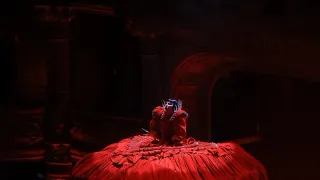May 29, 2019
Kick Off Pride Week in Style with the Boston Gay Men's Chorus
READ TIME: 5 MIN.
Yeah, Baby! The British are coming! Hopefully, you will be, too–to Boston Gay Men's Chorus' "God Save the Queens," that is. (What did you think we meant?)
Coinciding with the start of Boston Pride Week, BGMC will stage a frothy and fun-filled concert that celebrates the best of British rock and pop music from the Beatles to One Direction.
"These are the songs many of us grew up listening and dancing to," says BGMC Music Director Reuben M. Reynolds, III. "And we've got you covered whether you're in your 20s, 30s, 40s, 50s, or 60s and beyond!"
"God the Save the Queens" is at New England Conservatory's Jordan Hall May 31 and June 1 and 2. Get the full details from Reynolds in this interview right here. Cheerio!
Q: Judging from the music you've selected, "God Save the Queens" sounds like a royal blast! While we all know and love these artists and their songs, you guys always surprise audiences with new arrangements or interpretations of big hits. What's "new" in this show?
A: That's a great question. Well, we're going to end the concert just like we start it–spoiler alert!–with the Beatles and the masterpiece of a former Beatle. We'll close with a version of "Imagine," which was written by John Lennon. This is a new version of that has been arranged for men's choruses by Mari Esabel Valverde, a composer who is transgender. She studied years ago at San Francisco Conservatory with David Conte, who is a good friend of mine. I think she is the first publicly known trans composer.
Q: That's awesome! It's great that you can showcase the talents of a member of the community who is less well known alongside the work of queer icons like Boy George, Elton John, Bowie, and Freddie Mercury.
A: Isn't it? We love exposing our audiences to the many great and talented LGBT composers and artists. In that vein, "Imagine" will segue into a new arrangement of "Let It Be," that Chad Weirick, our assistant music director, has written. I told Chad to go as big as he could, so it's got like six modulations in it. We're going to have the audience sing along, and it will be a very feel-good ending to the show.
Q: We could all use a little feel-good right now, that's for sure. You call "God Save the Queens" a "brief history of British pop." Do you present that history chronologically, or in some other way?
A: We're mostly going chronologically. So we have to start with the Beatles with one of their really early hits called "Twist and Shout," which they didn't like. Of course, it's a big dance number for the chorus and they're having a blast with it.
Then we move on to "It's Not Unusual" by Tom Jones, which really gives you that British '60s vibe. Throughout the show, we're going to be using projections and talking about what happened during each era, including the Swinging '60s in London. So we'll do "Good Day Sunshine" and "Here Comes The Sun," by the Beatles; "To Sir With Love," the big Lulu hit; and "Downtown," by Petula Clark.
Q: Speaking of the '60s, this year marks the 50th anniversary of the Stonewall Uprising, which happened here in the U.S. Is there room to acknowledge that in the show, given your anglophile theme?
A: Of course, we can't have the anniversary of Stonewall without acknowledging it. So we're going to take a little detour in our history lesson and a chorus member will speak about how even though it was the swinging '60s in London, in the United States something momentous was about to happen: the LGBT community would be literally fighting back against years of abuse and oppression by New York City cops. So we'll sing "Somewhere Over the Rainbow," to pay tribute to Stonewall, which is fitting because Judy Garland's funeral took place on the first day of the riots. Some people say our community's grief over her untimely death was one of the things that fueled the riots.
Q: That sounds like an interesting way to bridge the decades, since 1970s and '80s music was a little queerer and freakier, at least aesthetically. Especially in England.
A: Yes! It's back to Britain for the '70s, which were getting a little weird indeed. To cover the '70s we have two songs, "Life On Mars" by David Bowie, who some people think was the most important pop musician after the Beatles; and "Candle In The Wind" by Elton John. And then we move to the '80s with a little Culture Club–"Karma Chameleon"–because you just have to in a show like this. The same is true of Eurythmics' "Sweet Dreams." Then we'll do some music by Rick Astley, who was a bit of a one-hit-wonder. His song "Together Forever" is silly pop that everyone will remember as soon as we start singing it. We end the set back in the 1970s with Queen's "Bohemian Rhapsody," "We Will Rock You," and "We Are The Champions."
Q: Whoa. How are you going to do "Bohemian Rhapsody"?
A: Just you wait! It's going to be fantastic!
Q: Where do the Spice Girls enter the historical record?
A: In Act II, after Frankie Goes to Hollywood's "Relax," which is just a scream with our dancers. Then we go into an a capella reimagining of Sting's "Fields of Gold," and it's just gorgeous. After that, we go to the world of the Spice Girls. We do "Spice Up Your Life," one of their big hits, and then we throw in a curve with "Three Little Maids From School Are We" from Gilbert & Sullivan's "The Mikado." We have three guys dressed all prim and proper and that number segues into "Wanna Be" by the Spice Girls.
Q: That sounds like a lot of fun. Is there a larger message for audiences in the music you've chosen, or is this really all about just having a good time?
A: Well, if you look at all the music on the program you'll find that's it's all about affirming who we are and finding what's deep inside of us and being true to it. And to drive that point home we'll sing Adele's big hits, "Rumor Has It" and "Someone Like You," which is just very, very powerful. This is mostly a fun show but still with a message. We're trying to hammer home the message that you're beautiful just as you are.
The Boston Gay Men's Chorus will perform "God Save the Queens," on Friday, May 31 and Saturday, June 1 at 8 p.m. and Sunday, June 2 at 3 p.m. at New England Conservatory's Jordan Hall in Boston. Tickets start at $25 before fees. Call 617-542-7464 or visit BGMC.org







